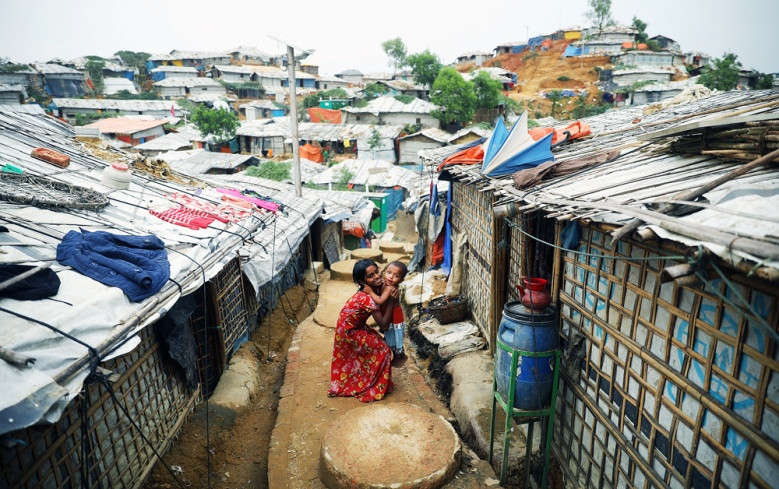Popular Reads
Top Results
Can't find what you're looking for?
View all search resultsPopular Reads
Top Results
Can't find what you're looking for?
View all search resultsWhat next for Rohingya after World Court ruling?
Change text size
Gift Premium Articles
to Anyone
I
t was a few weeks ago — on Jan. 23 — that the International Court of Justice (ICJ) issued what amounted to a “cease and desist” order against Myanmar, ordering authorities there to end genocidal practices against the Rohingya.
The ruling of the so-called “World Court” has brought hope that international justice will prevail after the horrors inflicted on women, men and children in Rakhine state by Myanmar’s security forces.
But while the court’s ruling was a landmark moment, there are still many lingering questions. What happens next? What effects will the ruling have on Myanmar’s domestic scene, where an election looms later this year? Will Myanmar comply with the order — and what happens if it does not?
The ICJ’s ruling meant that a global legal body for the first time officially recognized the real threat of abuse against the Rohingya, and ordered Myanmar to do what it can to protect them.
The ICJ called on Myanmar to prevent further breaches of the Genocide Convention, rein in abuses by its security forces and to preserve evidence of past abuses.
It is important to note, however, that the ICJ’s provisional order is in no way a final ruling on whether genocide has taken place. Genocide is defined as “acts committed with intent to destroy, in whole or in part, a national, ethnic, racial or religious group”.
The Convention against Genocide imposes a duty on states that are signatories to “prevent and to punish” genocide, thus the ability of The Gambia to bring the case to the ICJ.
The legal threshold for proving “genocidal intent” is notoriously high and a final decision will likely take years to reach, even if atrocity crimes against the Rohingya are already well documented. One of the ICJ’s 15 judges — Xue Hanqin, from China — has already issued an opinion questioning whether genocide took place and The Gambia’s right to even bring the case before the ICJ — an indication that this will be a drawn-our process with no easy answers.
While the decision is an important symbolic victory for the Rohingya, it remains to be seen how much effect the provisional measures will have in practice. The court has little power by itself to actually enforce the order. Like most international justice efforts, the ICJ’s effectiveness largely depends on the goodwill of states.
In one tragic example of its impotence, the ICJ in 1993 issued similar measures against Serbia after Bosnia had accused it of genocide. Just two years later, Serb forces killed thousands of Bosnian Muslim men and boys in what has become known as the Srebrenica massacre.
The government in Naypyitaw is now required to provide regular reports to the ICJ, starting in May this year, on what steps it has taken to prevent further abuse against the Rohingya. While Myanmar’s authorities are obliged under international law to comply with the order, they have already openly questioned the legitimacy of the court.
It is highly unlikely that we will see major, structural change of the kind Rohingya themselves are calling for, including dismantling a system of apartheid-like discrimination, or providing support for international justice efforts.
There are, however, private indications that Myanmar feels under enough pressure to want to show some signs of progress.
If Myanmar fails to act in good faith, the matter could be escalated to the United Nations Security Council (UNSC). However, the UNSC has been paralyzed over the Rohingya crisis so far, with China shielding Myanmar from censure.
Any UNSC action will essentially boil down to what China allows, making enforcement even more difficult.
Inside Myanmar, the ICJ case has come to dominate the national conversation. Aung San Suu Kyi’s supporters see her as a leader who is defending the nation’s honor, while Yangon has been littered with billboards proclaiming that she has the people’s support.
With national elections approaching later this year, there is no question that the case has brought an outpouring of public support for the ruling National League for Democracy party.
But that is far from true for the country as a whole. Remarkably, the ICJ has brought minority ethnic groups together in a way that was unthinkable just a few years ago. Civil society groups representing Karen, Kachin and others have all expressed their solidarity with the Rohingya.
Many of these groups have suffered abuses by the Tatmadaw — the Myanmar military — for decades, and have a deep interest in seeing those responsible brought to justice. On the eve of the court’s ruling, more than 100 local
Myanmar groups issued a delicately worded joint statement offering their support for “truth and justice”.
Beyond the ICJ, other avenues for international justice have also opened up recently over Myanmar. The International Criminal Court (ICC) has announced an investigation into alleged crimes against humanity by Myanmar against the Rohingya.
Separately, a Rohingya group has launched a so-called universal jurisdiction case against Myanmar’s leaders in Argentina. This rests on the principle that some crimes are so horrific that they concern humanity as a whole, and can therefore be tried anywhere in the world.
While it is easy to be cynical about what the precedent-setting ICJ ruling recently will actually accomplish in practice, the court order does reinforce the universality of human rights and the rule of law. It has also brought much needed hope to victims, and further pressure on Myanmar to show signs of progress.
We also have to remember that international justice is a long game, and one that is just getting started in Myanmar.
***
Head of the Asia Justice Coalition











